|
|

Posts: 20277
Location: oswego, il | We recently had a guide speak at our club and he brought up genetics and the declining average size fish he has been boating. Great guy, very knowledgeable and respected by all. Be mentioned Pennsylvania fish were first stocked and those were the biggest fish on average he had caught in the system. I was not at the meeting so I did not hear everything said, just the crowds take on the illinois mutt musky not being able to reach desirable size. The ilinois mutt is a combination of strains, Ohio, Iowa, Indiana, Wisconsin and probably Pennsylvania and possibly others. The strains on their own in their respective areas reach sizes much bigger than the Illinois mutt.
part of the debate is it the strain from mixing or it the lake from which it came causing a mutation? The lake has an average depth of 2ft deep water is 4 and one small 6' spot in 600+ acres of water. The fish there have average to thick builds but I have never seen one bigger than 42", caught bigger than 39 and seen a picture of one bigger than 44. This argument seems to be gaining traction, just curious what others may think.
my opinion first introductions of fish with good survival will always do very well. I think the Illinois musky may have mutated being a closed system as far as fish introduction which are.fish reproduced from that lake. They are either shorter lived or do not grow as long. Body mass, imho not an issue. |
|
| |
|
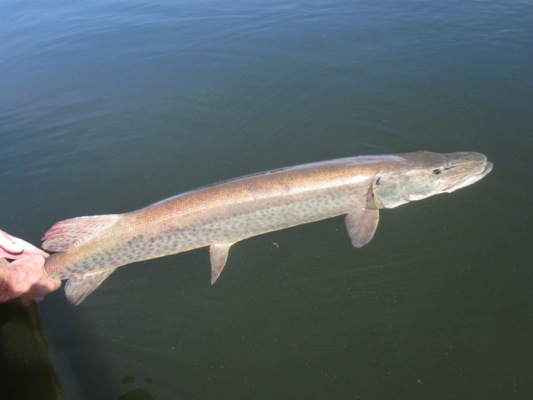
Posts: 8862
| It's been proven that different strains do better in different areas. While I don't know much about the IL "mutt" strain, it's my suspicion that it's as much to do with genetics as it is to do with the fact that many of the waters we are stocking just aren't conducive to growing a population of large muskies. Be it water chemistry, pollution, forage, depth, temperature, it all comes down to the fact that some lakes just don't have what it takes. While there might be a strain of musky from this or that place that will do better, that's only one small piece of the puzzle. If you look at where muskies typically do best in the Midwest, a lot of those systems have several things in common: Connected to other lakes, part of a river system, deep water, quality forage, shorter growing seasons, moderately fertile.... The smaller lakes that produce quality fish not only have the right chemical makeup and the right biomass, but they produce quality fish because they are relatively unfished. That's something that you're just not going to find on most public waters in IL.
We can meddle with these ecosystems to a point, and create some decent musky fisheries, but it seems to me that most of them are short lived, or fall quite short of our expectations.
I'm no biologist, but it seems to me that putting muskies where they do not belong has limited results. Even in suitable habitats, the first few year classes tend to do very well, and then the fisheries tent to level off once they are gone. |
|
| |
|

Location: Grand Rapids, MI | Is this solely based on this one anglers opinion without any data concerning age/sex/length? Generally the genetic mutt does well in varying water. My guess is it's simply a matter of the lake changing with the introduction of muskellunge. |
|
| |
|

Posts: 20277
Location: oswego, il | This is a very well respected and known angler, don't want to drag his name into it because nobody is faulting his findings just what the conclusions may be. Some believe it is purely genetic, mixing strains from all over the Midwest created a fish that has not been caught over 40lbs, yet every strain in the mix does on their own. My hypothesis is the mutation from coming from a very shallow lake with no new genetic introduction that produces a fish that does not get big enough. Body mass ok, length not. |
|
| |
|
Posts: 209
| they do not grow long (>45" 99% of the time) in that lake because of the stress they are under being in 2' of water all the time. However, their offspring does in every other IL lake they are placed in.
And when they do stock this lake (every 3 years) they occasionally mix up the strains they add to keep the "inbreeding" to a minimum. |
|
| |
|
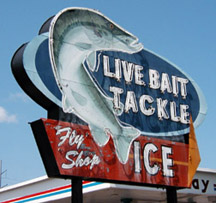
Location: Illinois | I think the fishery is doing well for it's relative age and average climate. Lower your expectations and you'll be fine. There is no magic pill. Lakes go in cycles everywhere. Just like it stopped peaking- it will stop declining. The digital age has made us covetous of our neighbors musky fisheries.
If you want the fishing to get better, institute a closed season. How many of the diehards who complain the Illinois muskies are too small would agree to sacrifice to make the fishery better? I would. |
|
| |
|

Posts: 8862
| muskellunged - 1/9/2014 6:02 PM
I think the fishery is doing well for it's relative age and average climate. Lower your expectations and you'll be fine. There is no magic pill. Lakes go in cycles everywhere. Just like it stopped peaking- it will stop declining. The digital age has made us covetous of our neighbors musky fisheries.
If you want the fishing to get better, institute a closed season. How many of the diehards who complain the Illinois muskies are too small would agree to sacrifice to make the fishery better? I would.
None of them. "closed seasons" were implemented to avoid muskies being taken through the ice and to protect them during the spawn. Ice fishing here in IL is not much of a factor. Very few muskies are caught through the ice, even in areas where ice fishing is hugely popular. The lakes here in IL are put and take fisheries. Natural reproduction is largely absent. There is nothing to protect during the spawn, because the eggs simply do not mature.
A better solution would be to ban fishing during high water temperatures, when delayed mortality is at its greatest. The diehards largely refrain from fishing during that time anyway. Sure, we have musky-envy of our neighboring states. But the smart folks accept that our fisheries are what they are because of WHERE they are and WHAT they are. Angling practices are not likely to change that very much. Regulations are not likely to change that very much.
Our fisheries here in IL are a result of geography and lack of lakes. No amount of money, effort, time, or regulation is going to change that. |
|
| |
|
Location: Eastern Ontario | If their offspring do well in other waters I would think that puddle there in is the limiting factor. I would never guess they would do as well as they seem to. You would think there must be a spring or some other exchange of water to prevent it from becoming musky soup in summer or freezing out in winter especially this winter. |
|
| |
|
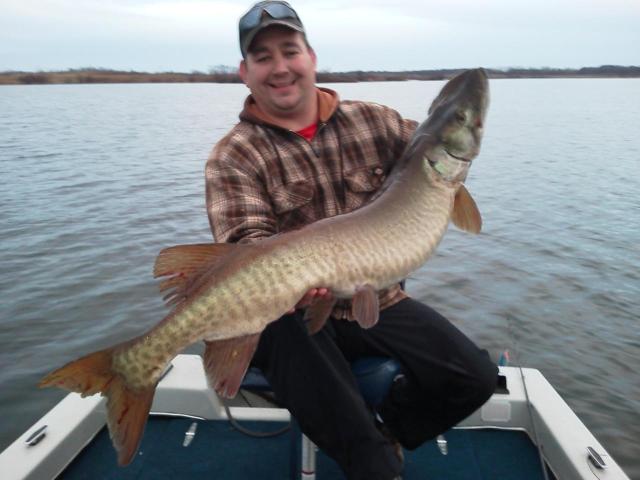
Posts: 427
| Try living in indiana where they stock five fish an acre a essentially feed muskie with muskie. At least Illinois tries to create a somewhat diverse fishery. |
|
| |
|

Posts: 20277
Location: oswego, il | I did not know spring was stocked with outside sourced fish, thought they came from fish brought to the hatchery from there. Saturday morning at the musky show there is an ima meeting with the DNR and the hatchery. The problem as its brought forth is that genetic mixing of all the strains have brought about a fish that does not grow huge, good proportion for its length but not giant when compared to neighboring states. My hypothesis which is completely my own, comes from other examples of fish wih locked in genetics that dont get big and a what I believe to be a closed genetic system for generations that have created a fish that does not get as big as we want. |
|
| |
|

Posts: 7107
Location: Northwest Chicago Burbs | Forage base? Seems as though the lakes with a strong base of oily/fatty forage (shads mostly) base show great growth rates and larger fish (Kinkaid, Shelbyville, Evergreen) whereas the lakes where the fish are foraging on suckers/perch/etc. have smaller fish. Thinking this might be why we are seeing more and better fish on the Fox Chain (to a degree) with a growth in the shad population there.
Again, just another totally non-scientifically educated angler's opinion based on what I have seen and have read about.
And, as I remember, Project Green Gene showed that a lot of pre-supposed ideas (spotted muskies are a cure all) were not at all supported by science and thusly shut a lot of arm chair biologists the F up. |
|
| |
|
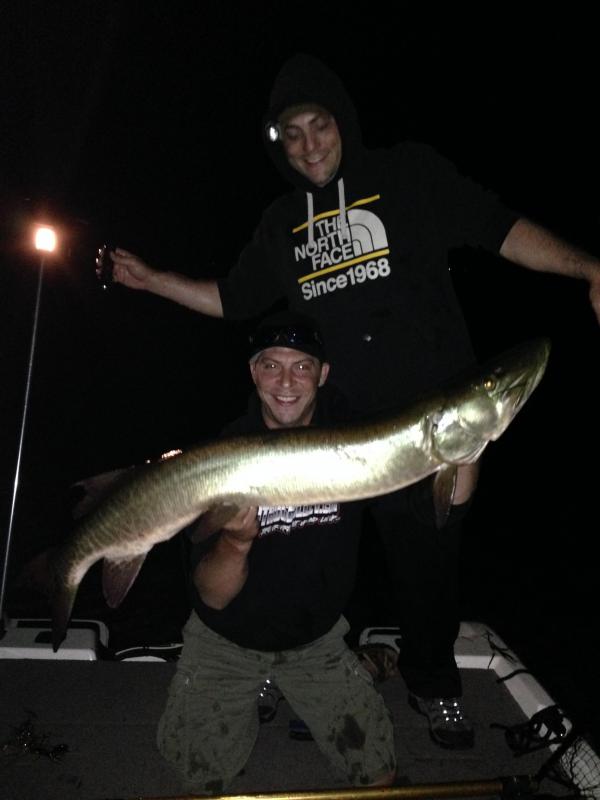
Posts: 1283
| What would you guys consider big for IL? From what Im reading/seeing IL muskies are getting bigger and bigger and showing up in places you would have never thought 20 years ago. |
|
| |
|
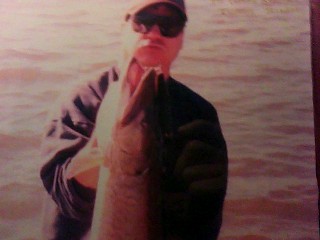
Posts: 371
Location: Dixon, IL | Lot of shad in Illinois so muskie grow very good but rare live longer than 12 years. That's why over 40 lbs is rare but I know few still out there! Ohio don't have any lakes that min size of 48 inch because they said that most musky are release and don't live long anyway. I agree that muskie in Illinois is much better than 20 years ago but more musky fishing pressure. Sterling Lake don't get any muskie since 2008 and I don't know why. Some fishermen there told me that they think that Lake Co forest preserve don't want people from Chicago come but I don't know. No muskie stock since 1999 in Independence Grove and none since 2008 in Sterling. My club just start stock some into Diamond Lake last Fall. For Trophy I would go Evergreen, Shelbville, Otter and Kinkaid. Other lake you never know are McMaster, Johnson, Shabbona, Fox Chain, etc. |
|
| |
|
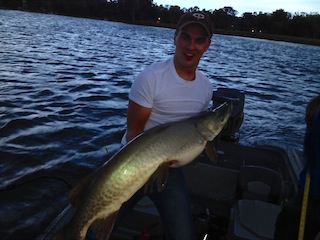
Posts: 1000
| I read somewhere that muskies in southern lakes tend to grow very fast, but live only 10-15 years. This results in a lot of good fish up to 40lbs, but they don't reach the maximum size potential of their northern counterparts. It just takes much longer up here.
Again, I can't cite anything. |
|
| |
|
Posts: 192
| I fish Kinkaid and as most everyone on here knows, large fish are very rare in there. I hear of very few 48" fish. The lake has plenty of shad for the fish to eat. They grow fast and die young.
My theory is we lose a lot of our bigger older fish every summer. The thermocline in Kinkaid is very shallow compared to other southern lakes and the fish get squeezed in the upper warm water zone and many just don't make it through the hot weather months. Just my theory.
Not sure I understand why the thermocline at Kinkaid is so much shallower than other "Southern" Muskie lakes like Green River and Cave Run but it seems to be true. The lake has a lot of deep water, the fish just can't use it when they need to escape the heat. |
|
| |
|

Posts: 7107
Location: Northwest Chicago Burbs | ILmuskie - 1/14/2014 7:31 AM
Lot of shad in Illinois so muskie grow very good but rare live longer than 12 years. That's why over 40 lbs is rare but I know few still out there! Ohio don't have any lakes that min size of 48 inch because they said that most musky are release and don't live long anyway. I agree that muskie in Illinois is much better than 20 years ago but more musky fishing pressure. Sterling Lake don't get any muskie since 2008 and I don't know why. Some fishermen there told me that they think that Lake Co forest preserve don't want people from Chicago come but I don't know. No muskie stock since 1999 in Independence Grove and none since 2008 in Sterling. My club just start stock some into Diamond Lake last Fall. For Trophy I would go Evergreen, Shelbville, Otter and Kinkaid. Other lake you never know are McMaster, Johnson, Shabbona, Fox Chain, etc.
I thought that about Sterling, too. But then I asked a IL DNR guy at the Chicago Show this year, said they do stock it every other yera. |
|
| |
|

Posts: 2754
Location: Mauston, Wisconsin | I would agree w/Horsehunter- The lake is the problem........ why don't you do something about the lake depth's? In Western WI, there is a lake created by a small hydro electric dam, where a coalition of fisherman, property owners, etc. got it dredged. It had essentially the same problem your lake has, it was a relatively shallow bowl. Working with the WI DNR, they got approval and had deep channels, holes, etc. dredged in the lake bottom... I see more boats out there fishing, not just dragging tubes & water skiers..or jet skiers everytime I drive by it now. The DNR actually stocked it with adult muskies from another northern WI lake that had an over population, thanks to a cohesive effort by the local God's Country MI Chapter and the muskie fishing community. I think it was great win for eveyone!
You have the muskies, but not the habitat they need to really grow big. I live close to a small WI river that is connected to the WI River. That river is 100' wide at its best, but has plenty of +20' holes created by oxbows and downed trees that hide some really big fish, including + 40" muskies.
Just some thoughts.
Have fun!
Al |
|
| |
|

Posts: 371
Location: Dixon, IL | Slamr - 1/24/2014 12:05 PM
ILmuskie - 1/14/2014 7:31 AM
Lot of shad in Illinois so muskie grow very good but rare live longer than 12 years. That's why over 40 lbs is rare but I know few still out there! Ohio don't have any lakes that min size of 48 inch because they said that most musky are release and don't live long anyway. I agree that muskie in Illinois is much better than 20 years ago but more musky fishing pressure. Sterling Lake don't get any muskie since 2008 and I don't know why. Some fishermen there told me that they think that Lake Co forest preserve don't want people from Chicago come but I don't know. No muskie stock since 1999 in Independence Grove and none since 2008 in Sterling. My club just start stock some into Diamond Lake last Fall. For Trophy I would go Evergreen, Shelbville, Otter and Kinkaid. Other lake you never know are McMaster, Johnson, Shabbona, Fox Chain, etc.
I thought that about Sterling, too. But then I asked a IL DNR guy at the Chicago Show this year, said they do stock it every other yera.
That's good to hear that and maybe they want to keep Sterling quite! I see one small musky followed my lure last spring. That's what I thought is a small natural reproduction. |
|
| |
|
Posts: 78
| My 2 cents for what its worth... The fact that the fish don't live nearly as long as the fish up north(Mn or Canada) coupled with the fishing pressure, that our lakes receive are two very good reasons we dont see the fish over 51-52". The shad make these fish heavy and they look very healthybut I bbelieve the length comes with age. Locally, they grow fast, look heavy but burn out and die in 10-15 years. So I guess for me the real question is, how do we get a strain that lives longer and can we get more lakes stocked to take the pressure off of the few lakes we do have and distribute the pressure out on other lakes. If we can accomplish these two things, I believe we have more of a chance to see true monsters here. Until then guys, 53" plus fish are merely a dream. At least in any kind of regularity. |
|
| |
|
Posts: 72
| A closed season is just plain DUMB . You changed muskellunged . |
|
| |
|
Posts: 40
Location: United States | All questions Todd that I though Project Green Gene was supposed to answer. However, in re-reading the Final report published by Illinois Natural History Survey I don't really see any "real" recommendations in the recommendations portions of the report. Rather more monitoring and observing is suggested. I find this a little confusing because this is titled the final report.
Here is what we know about Illinois and our neighboring states:
Illinois state record 38 lbs 8 ozs
Indiana state record 42 lbs 8 ozs
Iowa state record 50 lbs 6 ozs
Missouri state record 41 lbs 2 ozs
Kentucky state record 47 lbs 0 ozs
Illinois has been stocking natural muskies for roughly 30 years now and during that time created the cross bred mutt that we have today. Safe to assume that if we continue with the Illinois mutt you will not see fish over 50-51 inches. I am not sure how much more monitoring and observing is required to come to that conclusion? |
|
| |
|

Posts: 32954
Location: Rhinelander, Wisconsin | Careful with the 'cross bred mutt' stuff. That's been a flag that was already run up, tore down and burned white hot in a two year plus debate. Look at the 'it's the fish' debate from a few years ago in this forum, and Dr. Sloss's studies on Wisconsin Muskies some folks had decided were 'mutts'. Plenty of input from some of the top authorities on Muskies in the scientific community, too. |
|
| |
|
Posts: 40
Location: United States | Fair enough Steve but our own DNR uses the term. Please see the attached article.
http://www.outdoornews.com/February-2013/Muskie-study-taps-escapeme...
Edited by AaronSands 1/29/2014 6:56 AM
|
|
| |
 illinois genetics and size
illinois genetics and size illinois genetics and size
illinois genetics and size